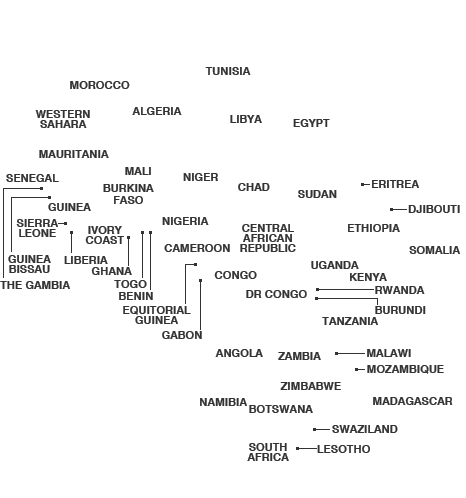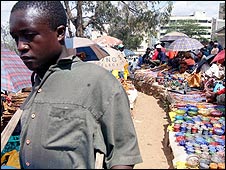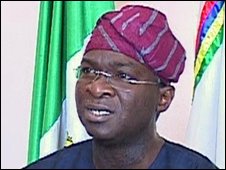From: Berhane Habtemariam (Berhane.Habtemariam@gmx.de)
Date: Sat Aug 22 2009 - 09:13:15 EDT
Q&A: Free trade zones in Africa
By Louise Greenwood
BBC Africa Business Report
Aug 22, 2009
http://newsimg.bbc.co.uk/shared/img/999999.gif
Across Africa, free trade zones are being set up between countries and even
at individual locations.
They claim to offer a cheaper and easier way to buy and sell goods, boosting
economies. But what are "free trade" or "tariff-free" zones and how do they
work?
AFRICA’S LARGEST FREE TRADE ZONES
http://news.bbc.co.uk/nol/shared/spl/hi/world/09/africa/img/labels.gif
Map showing Ecowas free trade bloc in AfricaMap showing Comesa free trade
bloc in AfricaMap showing Sadc free trade bloc in AfricaMap showing Africa
Free Trade Zones
What is a free trade zone?
Free trade zones, describe an arrangement where different trading entities,
usually member countries, agree to cut or scrap taxes in order to lower
business costs and remove bureaucracy. They are also known as "special
economic zones" and are mostly found in developing economies. The aim is to
give a massive artificial boost to trade, especially between raw material
producers and manufacturing based economies. These zones are also attractive
to foreign investors as it’s cheaper for them to do business there.
Why have they become so popular in Africa?
Economists argue that free trade zones are particularly suited to African
countries which were created under colonial occupation when land was divided
up, often with little regard for the economic sustainability of the newly
created plot.
Plus, post-independence conflict in Africa has left much of the continent
with a legacy of poor governance and a lack of political integration which
free trade zones aim to address.
For example, landlocked Uganda was almost ruined by the Ugandan-Tanzanian
War (1978-79). Today it remains dependent for the supply of finished goods
on its wealthier neighbour Kenya, with its international seaports.
Marketplace in Nairobi, Kenya
African states are looking for freer markets
The two countries entered into the East Africa Community Customs Union, EAC,
in March 2004, along with Tanzania.
However, these trading blocs are not always tariff-free. Kenya continued to
pay export duties to Tanzania and Uganda for five years after the EAC union
began, to compensate for the fact that it was a more prosperous, diversified
economy.
Other large free trade zones in Africa include SADC, the Southern African
Development Community (South Africa, Tanzania, Zambia and Zimbabwe) and
Comesa (Zimbabwe, Zambia, Uganda and Sudan), illustrating the point that
these "zones" often overlap.
Free trade zones can also cover individual areas within a country. The Lekki
free trade zone in Nigeria’s former capital, Lagos, aims to create a new
commercial hub by removing tariffs for international investors. Eritrea
plans a similar arrangement at its port at Massawa on the Red Sea coast.
Last October, plans were agreed to create a "super" free trade zone
encompassing 26 African countries, stretching from Libya in the north to
South Africa. The GDP of this group of nations is put at $624bn (£382.9bn).
What do free trade zones claim to offer?
The hope is that free trade zones will boost both trade and Africa’s
economic independence.
Babatunde Raji Fashola, governor of Lagos State
The Lagos State governor wants to boost Nigeria’s economic clout
Babatunde Raji Fashola, governor of Lagos state, told Africa Business
Report: "At airports, Nigerians are the people you see with excess luggage
and it comprises mainly of household goods, clothing.
"Every time we import goods, we invariably, without knowing it, export jobs
because we keep those industries offshore."
World trade experts also believe in the future, more of the world’s big
multi national deals will be "South-to-South", ie between Southern
Hemisphere nations.
A recent example is a plan by India’s mobile phone giant, Bharti Airtel, to
take a controlling stake in South Africa’s MTN. Free trade zones can greatly
boost the attraction of such deals.
Is there any evidence they work?
Some critics claim that free trade zones give an unfair advantage to
multinational corporations, who are able to manufacture in a low-cost base
and export around the world, rather than indigenous firms.
These companies are often given other incentives to locate in developing
economies, such as grants to help with set-up costs and lax employment
legislation, which trade unions and some charities claim are open to abuse.
Free trade zones can also take a long time to set up while member countries
agree terms. The East African EAC bloc took six years to come into being,
even though it was replacing a previous similar arrangement which collapsed
in the 1980s.
The fear is that the dominant economy will set the agenda for the bloc as a
whole – a criticism levelled at the SADC, which contains South Africa, the
continent’s only G20 member country.
But supporters say free trade zones are ultimately one of the fairest ways
for developing world economies so that they can begin to compete on a global
scale. They could even be extended to encompass other financial unions, such
as pan-regional banks and a common currency.



----[This List to be used for Eritrea Related News Only]----